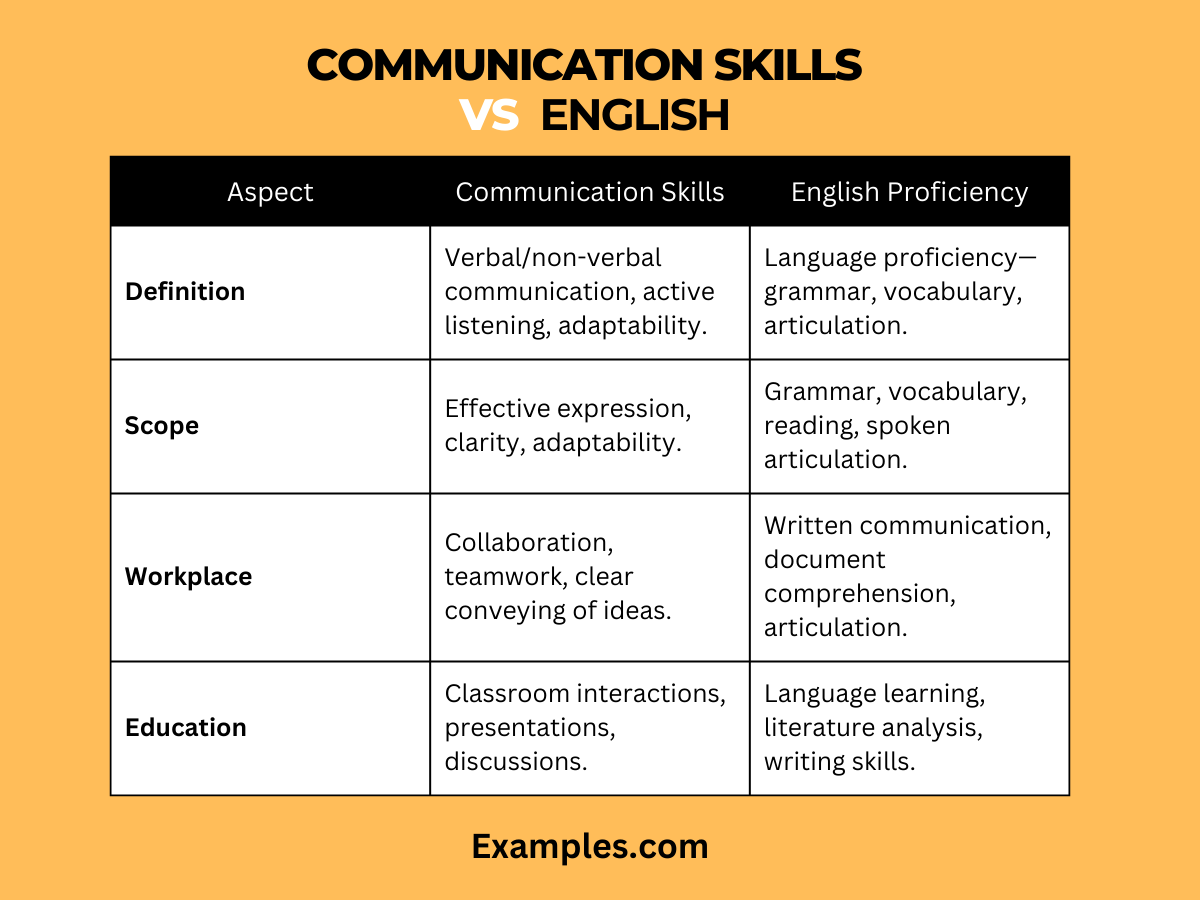Communication Skills vs English – 19+ Examples
Unlock the art of effective expression with our comprehensive guide on Communication Skills vs English. Navigating beyond language proficiency, we delve into the intricacies of communication, providing real-world Communication Examples. Elevate your language prowess, learn to articulate ideas with precision, and master the dynamics of impactful communication. Explore how blending linguistic finesse with communication skills opens doors to success in various personal and professional spheres.
Difference between Communication Skills and English
In the realm of effective expression, distinguishing between Communication Skills and English proficiency is paramount. Let’s delve into the intricacies of each, exploring their definitions, applications, and implications.

| Aspect | Communication Skills | English |
|---|---|---|
| Definition | Encompasses a broader range of abilities, including verbal and non-verbal communication, active listening, and adaptability. Communication skills go beyond language, emphasizing interpersonal dynamics and effective expression. | Focuses primarily on language proficiency, involving grammar, vocabulary, reading, and written and spoken articulation. English skills are foundational for clear communication but may not address broader interpersonal aspects. |
| Scope | Extends beyond linguistic aspects, involving effective expression, clarity, and adaptability in various contexts. Communication skills encompass verbal and non-verbal cues, listening, and understanding diverse communication styles. | Primarily concerned with linguistic aspects, emphasizing grammar rules, vocabulary, and language structure. English skills focus on language mechanics and may not cover broader communication dynamics. |
| Application in Workplace | Essential for collaboration, teamwork, and conveying ideas clearly. Effective communication skills improve leadership, conflict resolution, and relationship building within professional settings. | Facilitates written communication, comprehension of professional documents, and enhances the ability to articulate thoughts precisely. English skills are crucial in roles requiring strong written communication, such as documentation, emails, and reports. |
| Importance in Education | Critical for classroom interactions, presentations, and group discussions. Enhances learning through effective teacher-student communication and fosters a positive learning environment. | Focused on language learning, literature analysis, and writing skills. Strengthens reading comprehension and critical thinking, laying the foundation for academic success. |
| Cultural Sensitivity | Includes awareness of cultural nuances, non-verbal cues, and adapting communication styles for diverse audiences. Communication skills promote cultural sensitivity and effective communication in multicultural environments. | Primarily focuses on language usage and expression, with less emphasis on cultural sensitivity and non-verbal communication. English skills may not cover the nuances of cross-cultural communication. |
| Career Implications | Affects career advancement by influencing leadership qualities, teamwork, and effective communication with colleagues and clients. Strong communication skills enhance employability in various roles and industries. | Significant impact on job opportunities, especially in roles requiring strong language skills, such as writing, editing, and translation. Proficient English skills are essential for success in roles emphasizing written communication. |
20 Examples of Communication Skills and English
Explore the dynamic interplay between Communication Skills vs English through real-world examples. This guide unveils the synergy of articulate language and effective expression, offering insights that transcend linguistic boundaries.
10 Communication Skills Examples
- Active Listening: Engage fully in conversations, demonstrating attentiveness. For instance, in a meeting, paraphrase what someone just said to show you understand.
- Clarity in Expression: Convey thoughts clearly and concisely. When presenting, use simple language and avoid jargon for audience comprehension.
- Empathy: Understand and share others’ feelings. During conflicts, express understanding by saying, “I can imagine how that might feel.”
- Adaptability: Adjust communication style to suit different contexts. In team projects, tailor your message based on team members’ preferences.
- Open-Mindedness: Be receptive to new ideas. In brainstorming sessions, encourage diverse opinions without judgment.
- Conflict Resolution: Resolve disputes constructively. Address issues directly, using phrases like, “Let’s discuss how we can find a solution.”
- Nonverbal Communication: Master the art of body language. Maintain eye contact and use gestures appropriately for impactful communication.
- Effective Feedback: Provide constructive feedback. When reviewing work, highlight strengths and suggest improvements without criticism.
- Negotiation Skills: Persuade and compromise effectively. When discussing terms, find common ground and propose win-win solutions.
- Storytelling: Convey information through compelling narratives. When presenting data, weave a story to captivate your audience’s attention.
10 English Examples
- Mastering Grammar:
- Example: “Correcting grammar errors is crucial. Don’t let a misplaced comma change your message—proofread diligently.”
- Expanding Vocabulary:
- Example: “Enrich your lexicon. Replace common words with vibrant synonyms for impactful communication.”
- Effective Writing:
- Example: “Crafting concise yet compelling emails is an art. Capture attention with a clear message and impeccable language.”
- Articulate Speaking:
- Example: “Speak with clarity. Avoid filler words like ‘um’ to convey confidence and maintain audience engagement.”
- Active Listening:
- Example: “Sharpen your listening skills. Reflect on what’s said before responding for more meaningful conversations.”
- Reading Comprehension:
- Example: “Enhance comprehension. Summarize paragraphs in your own words to solidify understanding.”
- Professional Correspondence:
- Example: “Crafting a professional email is vital. Use formal language to convey respect and competence.”
- Persuasive Communication:
- Example: “Persuade with impact. Structure arguments logically and appeal to emotions for a compelling message.”
- Storytelling Proficiency:
- Example: “Master storytelling. Weave narratives that captivate, using vivid descriptions and relatable scenarios.”
- Adapting Tone:
- Example: “Adjust your tone. Tailor your language to the audience, ensuring your message is well-received in any context.
Comparison Between Communication Skills and English
| Aspect | Communication Skills | English Proficiency |
|---|---|---|
| Dimensions | Spans various dimensions, including verbal eloquence, non-verbal cues, active listening, and adaptability in diverse settings. | Centrally focuses on linguistic prowess, encompassing grammar intricacies, vocabulary mastery, and effective communication in English. |
| Contextual Application | Applicable across diverse contexts, contributing to successful collaborations, team dynamics, leadership, and nuanced interpersonal relations. | Primarily relevant in language-related scenarios, influencing written and spoken communication, literature interpretation, and comprehension skills. |
| Holistic Learning | Promotes holistic learning by incorporating cultural sensitivity, emotional intelligence, and the ability to navigate varied communication styles. | Concentrates on linguistic learning, refining reading comprehension, grammar accuracy, and proficiency in expressing ideas coherently. |
| Workplace Dynamics | Shapes positive workplace dynamics by fostering clear communication, cultural awareness, and adaptability crucial for professional success. | Holds significance in career pathways, impacting job roles that demand strong language skills, such as writing, translation, and language-based professions. |
| Educational Significance | Essential in educational settings, contributing to effective classroom interactions, presentations, and cultivating an environment of inclusive communication. | Integral for academic achievement, emphasizing language learning, literary analysis, and the development of refined writing and reading abilities. |
| Career Advancement | Drives career advancement by influencing leadership capabilities, teamwork, and the ability to communicate effectively with diverse audiences. | Plays a pivotal role in career progression, especially in professions where proficient language skills are imperative for precise and impactful communication. |
Communication Skills vs English in Business
In the corporate realm, strong communication skills foster effective collaboration, while English proficiency ensures precise conveyance. Mastering both enhances professional interactions, from articulate presentations to impactful written correspondence, contributing to career growth.
- Facilitating Meetings: Lead meetings with clarity, ensuring everyone comprehends key points.
- Professional Emails: Craft concise, well-structured emails to convey professionalism and clarity.
- Client Presentations: Engage clients with articulate English, using persuasive communication to highlight key benefits.
- Negotiation Skills: Negotiate effectively using precise English, understanding and responding to counterpart cues.
- Team Collaboration: Foster teamwork by articulating ideas clearly and understanding diverse perspectives.
- Business Proposals: Write compelling proposals in impeccable English, showcasing professionalism and attention to detail.
- Customer Service Calls: Resolve issues diplomatically, employing excellent English for positive customer interactions.
- Cross-Cultural Communication: Navigate cultural nuances in business discussions, using English to bridge communication gaps.
- Leadership Communication: Lead with clarity, using English to inspire and guide team members effectively.
- Report Writing: Convey data and insights effectively in reports, ensuring clarity for all stakeholders.
Does English Improve Communication Skills?
The relationship between English proficiency and communication skills is dynamic and symbiotic. Mastery of the English language significantly enhances overall communication abilities. Adept English speakers demonstrate clarity, precision, and effective expression. Proficiency in English facilitates nuanced interactions, boosts confidence, and opens doors to diverse communication scenarios. Whether navigating business dialogues, academic discussions, or social interactions, a strong command of English enriches the depth and impact of communication. As a result, investing in English proficiency undoubtedly contributes to the improvement and refinement of essential communication skills.
In conclusion, the synergy between communication skills and English proficiency is indispensable. Mastering both amplifies the effectiveness of interpersonal interactions, fosters professional success, and enables seamless navigation of diverse scenarios. The comprehensive guide explored various facets, from business applications to language nuances, offering insights and examples for holistic development. Elevate your communication prowess by embracing the fusion of refined skills and linguistic adeptness.



